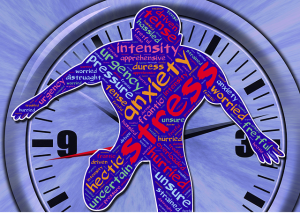This site does not provide medical help
 Asthma can be a cause of anxiety for some individuals. There are several reasons for this:
Asthma can be a cause of anxiety for some individuals. There are several reasons for this:
Fear of Asthma Attacks
The sudden and often unpredictable nature of asthma attacks can be frightening. People with asthma may worry about when the next attack will occur, how severe it will be, and whether they will have access to their medication in time. This fear of the unknown can lead to anxiety.
Breathlessness
During an asthma attack, individuals may experience severe breathlessness, which can be very distressing. This sensation of not being able to breathe properly can trigger anxiety and panic in some people.
Medication Concerns
Asthma is typically managed with medications like inhalers. Some individuals may worry about the side effects of these medications or whether they are using them correctly, which can contribute to anxiety.
Impact on Daily Life
Asthma can affect a person’s ability to engage in physical activities, sleep well, or even go about their daily routines. This impact on daily life can lead to frustration and anxiety.
Social Stigma
There can be a stigma associated with asthma, particularly if others do not understand the condition. This stigma or the fear of judgment from peers can contribute to anxiety.
Health Anxiety
People with asthma may develop health anxiety, constantly worrying about their condition and potential complications. This excessive concern can lead to generalized anxiety.
It’s important to note that not everyone with asthma experiences anxiety, and the degree of anxiety can vary greatly from person to person. If you or someone you know is struggling with anxiety related to asthma, it’s essential to seek support. This support can come in the form of healthcare professionals, support groups, therapy, and education about asthma management. Properly managing asthma with a healthcare provider’s guidance can also help reduce anxiety by providing more control over the condition.
Anxiety and VCD
Vocal cord dysfunction (VCD), also known as paradoxical vocal fold motion (PVFM), is a condition that can share some similarities with asthma but is fundamentally different. VCD and asthma can both cause breathing difficulties and have similar symptoms, which can lead to misdiagnosis or confusion. However, they are distinct conditions with different underlying causes and treatments. Just like with asthma, the unpredictable nature of VCD episodes can cause anxiety, as individuals may worry about when the next episode will occur and how it will affect their daily life, as VCD can make it challenging to engage in physical activities or speak clearly, which can contribute to feelings of frustration and anxiety.
Key Differences
Underlying Cause
Asthma is primarily a chronic respiratory condition characterized by inflammation and narrowing of the airways, often triggered by allergens or irritants. It typically responds well to bronchodilator medications and anti-inflammatory drugs.
VCD is a functional disorder of the vocal cords. It occurs when the vocal cords close or constrict when they should be open during breathing, leading to breathing difficulties. The cause of VCD is often related to issues with the coordination of the vocal cords, which may be triggered by stress, anxiety, or other factors.
VCD can sometimes mimic the symptoms of asthma and lead to anxiety due to the distress it can cause. However, VCD and asthma are distinct conditions with different underlying causes. VCD attacks can come on suddenly and be very distressing. The sensation of not being able to breathe properly can trigger anxiety and panic.
Symptoms
Both conditions can cause shortness of breath, wheezing, and coughing. However, in asthma, these symptoms are typically due to airway constriction and inflammation, while in VCD, they result from vocal cord dysfunction. VCD can also produce stridor, a high-pitched sound when inhaling, which is not typically associated with asthma. In VCD, the vocal cords in the throat do not function correctly. Instead of opening during inhalation and exhalation, they may close partially or fully, which can restrict airflow and cause symptoms similar to asthma, such as shortness of breath, wheezing, and coughing. People with VCD may experience episodes that seem like asthma attacks, making it challenging to breathe.
Triggers
Asthma attacks are often triggered by allergens, respiratory infections, exercise, or environmental irritants, while VCD symptoms are more likely to be triggered by emotional stress, anxiety, or irritants.
Misdiagnosis
VCD is often misdiagnosed as asthma because the symptoms can be quite similar. Misdiagnosis can lead to frustration and anxiety, as people may not receive the appropriate treatment for their condition.
Treatment
Asthma is commonly managed with bronchodilators, inhaled corticosteroids, and other medications aimed at reducing airway inflammation and bronchoconstriction, whereas
VCD is typically treated with speech therapy or behavioral techniques that help individuals learn to control their vocal cord function. In some cases, managing any underlying psychological factors, such as stress or anxiety, can also be beneficial.
If you suspect you have VCD or have been diagnosed with it, it’s important to work with a healthcare professional, preferably a specialist like a speech therapist or otolaryngologist, to properly diagnose and manage the condition. They can help you develop a treatment plan and provide strategies to reduce anxiety and improve your quality of life.